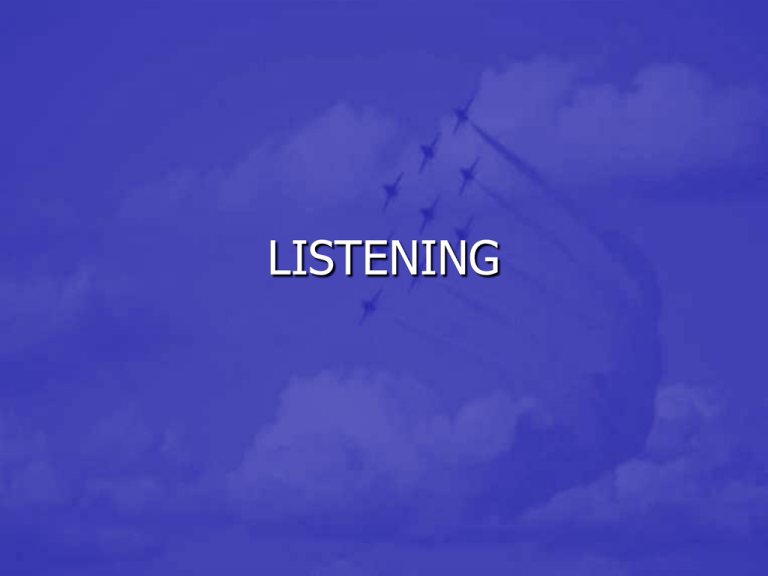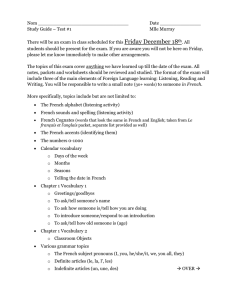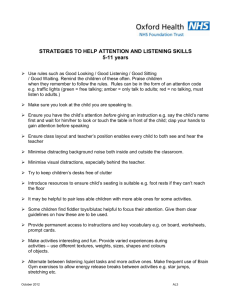
LISTENING
OBJECTIVES
• Understand the listening process
• Develop listening skills
WHY LISTENING?
(Bolton)
• Words have different meanings for
different people
• People often “code” their messages
• “Presenting” vs. actual problem
• Speakers may be blind to their emotions
• Listeners are easily distracted
• Listeners hear through filters that distort
the message
Active Listening (AL)
• AL is used when:
– The OTHER PERSON owns the problem
– It’s not your problem
– You are coming from a place of “helpfulness”
• AL based on:
– Empathy
– Getting in touch with feelings behind the words
– Acceptance
– Confirmation
Copyright 2001 FrontierWorks and Karen L. Rancourt, All Rights Reserved
.
LEVELS OF LISTENING
(Covey)
1. Ignoring
2. Pretending
3. Selective Listening
4. Attentive Listening
5. Empathic Listening
DEVELOPMENTAL STAGES
(Covey)
1. Mimic content
2. Rephrase content
3. Reflect feeling
4. Rephrase content and reflect feeling
LISTENING SKILLS
(Bolton)
1. Attending Skills (giving physical attn.)
•
•
•
•
A posture of involvement
Appropriate body motion
Eye contact
Nondistracting environment
•
•
•
•
Door openers
Minimal encourages
Infrequent questions
Attentive Silence
2. Following Skills (get out of the way)
LISTENING SKILLS (cont.)
3. Reflecting Skills
•
•
•
•
Paraphrasing
Reflecting feelings
Reflecting meanings (tying feelings to
content)
Summative reflections
LISTENING BLOCKS
(Covey)
• Evaluating – we agree or disagree
• Advising – we give counsel based on our
experience
• Probing – we ask questions from our
frame of reference
• Interpreting – we try to understand based
on our motives and behavior
BARRIERS TO COMMUNICATION
• Judging
– Criticizing
– Name-calling
– Diagnosing
– Praising evaluatively
BARRIERS TO COMMUNICATION
• Sending Solutions
– Ordering
– Threatening
– Moralizing
– Excessive/Inappropriate Questioning
BARRIERS TO COMMUNICATION
• Avoiding the Other’s Concerns
– Advising
– Diverting
– Logical argument
– Reassuring
PERCEPTUAL BARRIERS
• Frames of Reference
• Semantics
• Filtering
• Selective Listening
• Value Judgments
• Relationships
LEFT-HAND COLUMN
• Left-column represents thoughts and
feelings relevant to conversation but not
articulated.
• Right-column is what was actually said
• Organizations (and people) develop topics
that are taboo
• When your left-hand column is active you
are diminishing your ability to listen
Example #1 of Active Listening (AL)
Sender: “I was really annoyed when I
presented Tom’s findings at the
meeting. They were loaded with errors.”
Non-AL Response: “Well, Tom said you
were in such hurry to get the stuff, he
didn’t have time to check them.”
AL Response: “I imagine that caused you
great embarrassment.”
Copyright 2001 FrontierWorks and Karen L. Rancourt, All Rights Reserved
.
Example #2 of Active Listening (AL)
Sender: “Finance is holding up my
expense check for some dumb
reason and I am broke.”
Non-AL Response: “That doesn’t
surprise me. The way you write
they probably can’t read them.”
AL Response: “I can tell this is really
annoying you.”
Copyright 2001 FrontierWorks and Karen L. Rancourt, All Rights Reserved
.
Example #3 of Active Listening (AL)
Sender: “I just can’t believe how
ridiculous the feedback is we’re getting
from XYZ.”
AL Response: “Sounds like the quality of
feedback has…”
…disappointed you.
…let you down.
…upset you.
Copyright 2001 FrontierWorks and Karen L. Rancourt, All Rights Reserved
.
Example #4 of Active Listening (AL)
Sender: “Oh, I guess this project’s going
okay…”
AL Response: “Sounds like this project…”
…has you down in the dumps.
…is discouraging you.
…is leaving you weary.
Copyright 2001 FrontierWorks and Karen L. Rancourt, All Rights Reserved
.
Example #5 of Active Listening (AL)
Sender: “That system design meeting
went like a hot knife through butter…”
AL Response: “I gather that…”
…you’re pleased.
…you’re excited.
…you’re pumped up.
Copyright 2001 FrontierWorks and Karen L. Rancourt, All Rights Reserved
.
Active Listening Phrases
• Sounds like…
• Seems like…
• It seems to you…
• From where you
stand…
• You think…
• Correct me if I’ve
misunderstood…
• Let me see if I’m
getting this right...
• You believe…
• I’m sensing …
• I’m picking up that…
• Could it be that…
• What I hear you
saying is that…
• If wonder if you’re
feeling…
• Let me check this out
with you...
Copyright 2001 FrontierWorks and Karen L. Rancourt, All Rights Reserved
.
CAPTAIN COOK CASE
• Begin the role play by having the manager explain why
•
•
•
•
•
•
•
the meeting has been requested.
Continue until a resolution has been reached or time is
up, whichever comes first.
Try to use listening skills
The manager and employee should fill out the left-hand
column worksheet.
The observers should complete the observer worksheet.
Once the worksheets are complete, the manager and the
wait person should describe how they felt during the role
play and in what ways they acted differently from their
usual behavior in the face of conflict.
Group discussion
Class discussion







